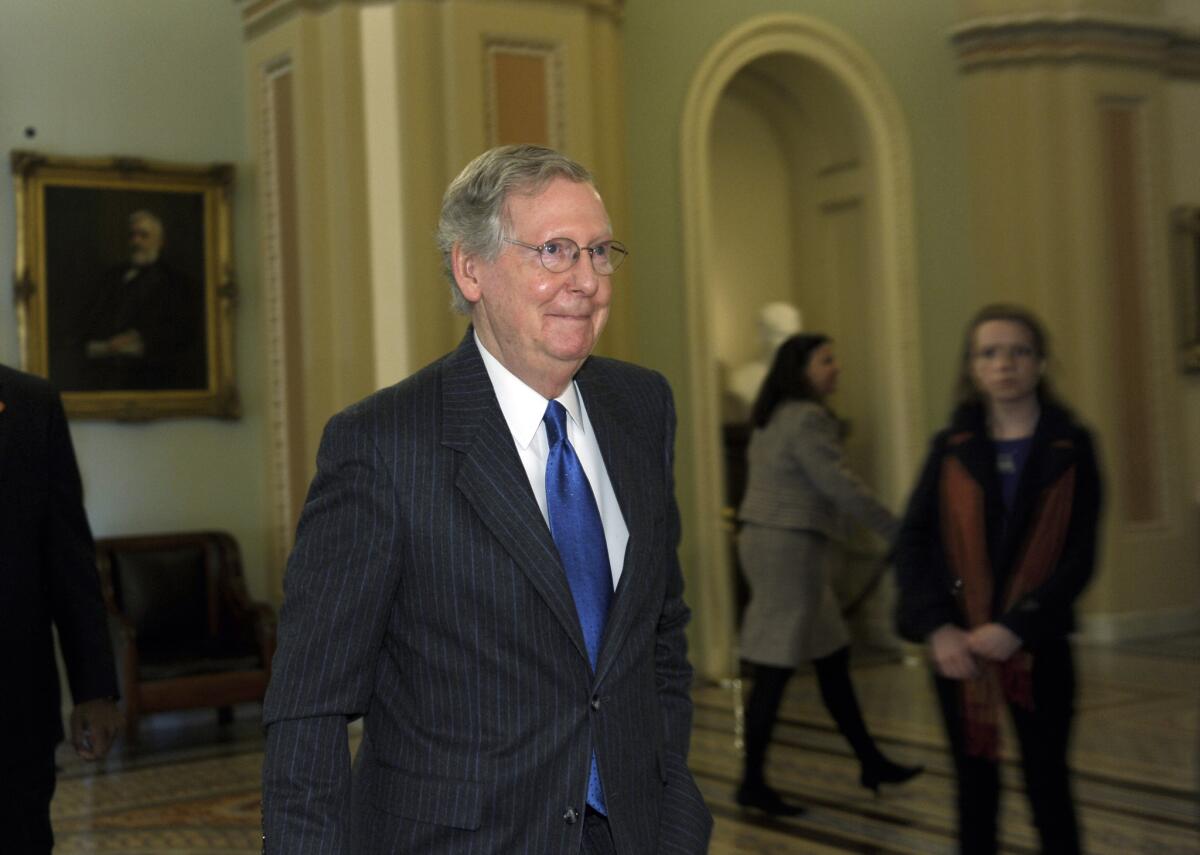Senate closes in on compromises for budget, jobless insurance

- Share via
WASHINGTON -- As senators narrowed their differences on a proposal to break a stalemate over unemployment insurance, congressional leaders reached agreement late Monday on a $1-trillion spending package to avoid a government shutdown this week.
The intense day of private negotiations on Capitol Hill shows a Congress that is trying to move past the partisan brinkmanship that has paralyzed the legislative process in recent years. Republicans, in particular, have calculated that voters are tired of the gamesmanship and want the federal government to provide basic services.
Votes are set for Tuesday in the Senate on the jobless aid package as a small group of key Republican senators emerged as a potential voting block that could form a coalition for compromise with Democrats.
The nine senators, who made a new proposal late Monday, have publicly split with those hard-line conservatives in their party who see jobless aid as a handout that provides a disincentive to work.
The GOP package Monday would extend jobless aid for three months, meeting their party’s insistence that costs be fully paid for with cuts elsewhere in the budget. And in a nod to their desire to make the Senate run more smoothly, they also are seeking a promise from Democrats, who have the majority in the chamber, for the chance to offer further amendments on the bill.
“It’s a good offer,” said Sen. John Hoeven (R-N.D.), who was among those who huddled privately Monday to craft the effort.
But Democrats were cool to the proposal because they want to guarantee benefits for a longer duration, perhaps a year. Moreover, Senate Majority Leader Harry Reid (D-Nev.) has been reluctant to open the debate to a freewheeling amendment process out of concern that Republicans will offer partisan proposals on Obamacare or other topics that could be politically difficult for Democrats who are up for reelection this year.
“As everyone knows, the president is not in favor of a three-month proposal and I’m not either, but that doesn’t mean that we can’t work something out,” Reid said late Monday. A test vote that had been set for Monday evening was pushed to Tuesday to give senators time to work on a deal.
At the same time, budget negotiators on Monday were finishing up a $1-trillion spending bill to avoid a government shutdown Wednesday, when money to fund the government runs out.
The bill sets in motion the bipartisan accord struck late last year by Rep. Paul D. Ryan (R-Wis.) and Sen. Patty Murray (D-Wash.) that signaled the first major breakthrough in the budget battles in several years.
The legislation provides funding for almost every aspect of government for the remainder of the fiscal year, through Sept. 30.
Neither side expects to shut down the government, as happened for 16 days in October, when Republicans fought to undo Obamacare as part of any deal to fund the government.
But conservative tea party lawmakers are expected to oppose the spending bill in both the House and Senate, which may prolong the debate into the end of the week. They resisted the Ryan-Murray accord, arguing that it increased spending too much.
Because time is short to pass the giant bill before Wednesday’s shutdown deadline, the House on Tuesday is set to consider a three-day stop-gap measure. It would fund the government through midnight Saturday as lawmakers work to pass the larger bill by the end of the week.
The jobless aid has been on a separate legislative track, which has made it increasingly difficult to pass as Republicans have raised objections to the cost.
An estimated 1.3 million Americans had their federal benefits cut off Dec. 28 after Congress declined to continue the program. Another 72,000 Americans each week are expected to lose benefits. The federal aid provides compensation for the long-term unemployed after the typical 26 weeks of state insurance runs out.
“We continue to negotiate in good faith, and we are all encouraged that we are making progress on a package that could pass with bipartisan support,” the GOP senators said in a joint statement Monday evening.
The Democratic proposal to extend aid was initially expected to gain little support from the GOP, but several Republicans from high-unemployment states stepped forward last week to advance the bill. But a Democratic proposal to pay for the costs with future budget cuts by continuing the so-called sequester reductions was panned by the GOP. The Republican proposal would make the cuts more immediately by deepening the sequester cuts.
Both parties also propose cutting the number of eligible weeks of jobless aid and restricting the ability of Social Security Disability Insurance recipients to also collect unemployment insurance.
The nation’s continued sluggish economy and a disappointing jobs report for last month has provided momentum to the effort, especially as pocketbook issues push to the forefront of the midterm election that will determine control of Congress.
Follow Politics Now on Twitter and Facebook
Twitter: @lisamascaroinDC
More to Read
Sign up for Essential California
The most important California stories and recommendations in your inbox every morning.
You may occasionally receive promotional content from the Los Angeles Times.











